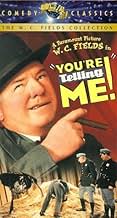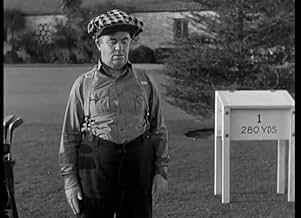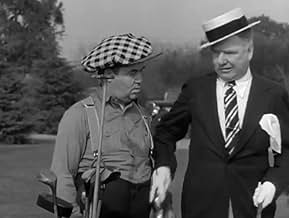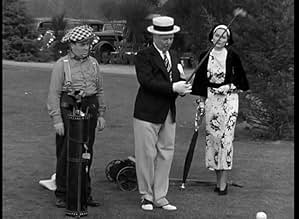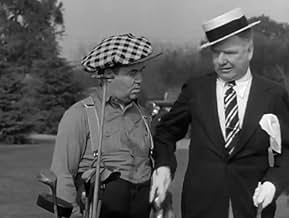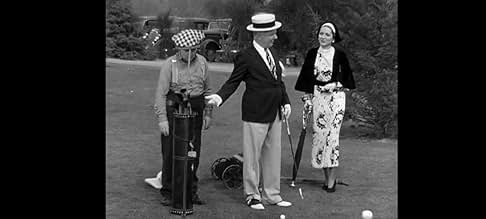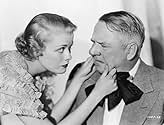IMDb-BEWERTUNG
7,4/10
1253
IHRE BEWERTUNG
Füge eine Handlung in deiner Sprache hinzuA hard-drinking, socially-awkward inventor wrecks his daughter's chances of marriage into a rich family and bungles his own chances of success by selling one of his more practical inventions... Alles lesenA hard-drinking, socially-awkward inventor wrecks his daughter's chances of marriage into a rich family and bungles his own chances of success by selling one of his more practical inventions.A hard-drinking, socially-awkward inventor wrecks his daughter's chances of marriage into a rich family and bungles his own chances of success by selling one of his more practical inventions.
- Auszeichnungen
- 1 wins total
Buster Crabbe
- Bob Murchison
- (as Larry 'Buster' Crabbe)
Dell Henderson
- Mayor
- (as Del Henderson)
Robert McKenzie
- Charlie Bogle
- (as Robert Mc Kenzie)
William Bailey
- Tire Company Executive
- (Nicht genannt)
Eddie Baker
- First Motorcycle Cop
- (Nicht genannt)
Dorothy Bay
- Mrs. Kendall
- (Nicht genannt)
Harold Berquist
- Doorman
- (Nicht genannt)
Don Brodie
- Waiter
- (Nicht genannt)
Elise Cavanna
- Sarah Smith - Female Gossip
- (Nicht genannt)
Empfohlene Bewertungen
10Tashtago
It's amazing how much got squeezed into this 66 minute film. "You're Telling Me" contains some of Fields best work. The golf routine at the end is classic, although a little shorter than in the previously filmed "the Golf Specialist" which features a different and even more revolting caddy. What I noticed on seeing this film again after many years is what a good actor Fields is, especially in the scene where he talks the princess out of suicide. The supporting cast is also very good especially the aforementioned Kathleen Howard. No other comedian could get away with the scene where Fields knocks himself out with one of his inventions and two scenes later is still unconscious. As a Fields fan this a 10. Favorite line: "Your alright Mayor, I voted for you in the last election...five times."
Does anyone out there know where I can find a copy of "Man on the Flying Trapeze" ? Any information is much appreciated.
Does anyone out there know where I can find a copy of "Man on the Flying Trapeze" ? Any information is much appreciated.
10gregvw
This is one of the funniest films I've ever seen. Fields stars as Sam Bisbee a liquor-loving inventor who is trying to sell his puncture-proof (actually bullet-proof) tires to a major corporation. The son of a wealthy socialite proposes to Bisbee's daughter, only to be foiled by his mother when she encounters the uncouth Bisbee. On top of ruining his daughter's potential marriage, Sam also loses his car and several other inventions and mistakenly shoots the tires of a police car. The resolution involves a princess, Bisbee running down mainstreet with an ostrich on a rope, and a classic Fieldsian attempt at hitting a golf ball (which somehow results in a pie getting stuck to his hat.)
Do yourself a favor and see this movie!
Do yourself a favor and see this movie!
You're Tellling Me finds W.C. Fields pitted against the world again, the immediate world and the outside world. And Fields fights it with the weapons of his choice, rye or gin. You're Telling Me actually does get a bit serious for a while.
He's Sam Bisbee in this film, ne'er do well optometrist and full time henpecked husband of Louise Carter and father of Joan Marsh. Joan would like to marry Buster Crabbe who's the son of the town's leading snob Kathleen Howard, but it looks hopeless.
Fields's one love besides his family and booze is inventing things. He actually may have something in a puncture proof tire. But in a demonstration where he shoots the tires of a police car it gets him in some trouble.
Here's actually where this Fields comedy takes a serious turn. He's actually contemplating suicide on the way back home on the commuter train, but then seeing a young lady Adrienne Ames in distress and contemplating the same thing, he talks her and ironically himself out of it. She turns out to be his guardian angel in many ways and turns the tide for new friend socially and economically.
This was first the first film Fields did with Kathleen Howard. Someone at Paramount must have seen something because the following year they were teamed as husband and wife in It's A Gift. She became Fields's Margaret Dumont in that one.
You're Telling Me is the film where Bill Fields got do his golf routine which is almost as famous as his pool shark specialty. It comes at the end of the film where a contrite town who just thought of him as the town drunk, now asks him to open their new country club. It's still holds very well today and a source of amusement for duffers everywhere.
In fact the whole film is as amusing as it was when it premiered in 1934. The comedy of W.C. Fields is timeless.
He's Sam Bisbee in this film, ne'er do well optometrist and full time henpecked husband of Louise Carter and father of Joan Marsh. Joan would like to marry Buster Crabbe who's the son of the town's leading snob Kathleen Howard, but it looks hopeless.
Fields's one love besides his family and booze is inventing things. He actually may have something in a puncture proof tire. But in a demonstration where he shoots the tires of a police car it gets him in some trouble.
Here's actually where this Fields comedy takes a serious turn. He's actually contemplating suicide on the way back home on the commuter train, but then seeing a young lady Adrienne Ames in distress and contemplating the same thing, he talks her and ironically himself out of it. She turns out to be his guardian angel in many ways and turns the tide for new friend socially and economically.
This was first the first film Fields did with Kathleen Howard. Someone at Paramount must have seen something because the following year they were teamed as husband and wife in It's A Gift. She became Fields's Margaret Dumont in that one.
You're Telling Me is the film where Bill Fields got do his golf routine which is almost as famous as his pool shark specialty. It comes at the end of the film where a contrite town who just thought of him as the town drunk, now asks him to open their new country club. It's still holds very well today and a source of amusement for duffers everywhere.
In fact the whole film is as amusing as it was when it premiered in 1934. The comedy of W.C. Fields is timeless.
8tavm
W.C. Fields was one comedian from the movies' golden age that took me a while to like as a kid. The first time I remember laughing at him was when, in Fatal Glass of Beer, he keeps looking at the open window and saying, "And it ain't a fit night out for man nor beast!" after which snow would hit him in the face! You're Telling Me! has plenty of funny visual and verbal gems that keep the movie breezing along for little more than an hour. Among the highlights are the beginning when Mr. Fields, coming home drunk, encounters a curtain constantly along with his angry wife who keeps telling him to take off his hat and put down his shoes, his talking a princess on a train out of "suicide" after failing to attempt one himself (because of constant interruptions), his struggles with an ostrich he buys for his wife, and his golf game at the end that also gets delayed with various distractions especially from the caddy (Fields also did this routine on his talkie debut, The Golf Specialist). You're Telling Me! is one of Fields' classics that should be essential viewing for anyone wanting to be introduced to his work.
This is yet another delightful W.C. Fields vehicle which he had already made as a Silent, under the name SO'S YOUR OLD MAN (1926). Actually, the first half of this comedy classic is possibly the best of the four titles I've watched so far from Universal's second Fields set (with several hilarious gags taken by the star as far as they can go); the latter section lacks that initial sparkle, despite its climaxing with his famous golf routine (which had also been the basis of his short THE GOLF SPECIALIST [1930]).
Interestingly, the film combines the star's two basic personality traits: here, he's both henpecked and con-man (playing an inventor of unlikely gadgets). There's the usual romance hindered by class distinction (see also THE OLD FASHIONED WAY [1934]) between Fields' livelier-than-usual daughter - played by Joan Marsh - and future Flash Gordon Larry "Buster" Crabbe; lovely Adrienne Ames brings an exotic touch to the proceedings as a princess who befriends the star on a train (gossiping womenfolk from Fields' hometown think he's having an affair) and determines to 'elevate' his social position. The train sequence is marked by an unexpected poignancy, with the Fields character's intention of committing suicide after blowing his get-rich-quick scheme.
Among the highlights are: Fields ruining his daughter's prospects by his "naïve gauchery" when Crabbe's snobbish upper-crust mother comes visiting; his demonstration of the damage-proof tyre (Fields doesn't realize that his vehicle has been moved and that he's firing at the wheels of a police-car - the scene is capped by the car-radio's announcement of the very 'crime' being committed upon it!); Fields inadvertently drinking from a roach exterminating potion of his own invention but, after turning to the genuine stuff, decides that the former is more to his liking!; when he returns home a failure, Fields tries to soften the blow to his family honor by buying his wife a pet - a large ostrich he's unable to control and ends up losing practically immediately! And the best lines: the "Mrs. Bisbee, you're the luckiest woman in the world" - "Is my husband dead?" exchange between the princess and Fields' wife; the star's remark to the princess about Mrs. Bisbee's "uncalled for sarcasm".
Director Kenton is better known for his horror stuff, notably ISLAND OF LOST SOULS (1933) - also made at Paramount - and such Universal 'B' monster flicks as THE GHOST OF FRANKENSTEIN (1942), HOUSE OF FRANKENSTEIN (1944) and HOUSE OF Dracula (1945); he did, however, helm three above-average Abbott & Costello comedies a decade after making his solo W.C. Fields vehicle.
In conclusion, even if Fields was essentially a Talkie comedian, I still wish that some of the earlier versions of his classic films were more readily available (I'm only familiar with the star's Silent work through his debut short POOL SHARKS [1915], featured on Criterion's W.C. FIELDS: 6 SHORT FILMS disc)...
Interestingly, the film combines the star's two basic personality traits: here, he's both henpecked and con-man (playing an inventor of unlikely gadgets). There's the usual romance hindered by class distinction (see also THE OLD FASHIONED WAY [1934]) between Fields' livelier-than-usual daughter - played by Joan Marsh - and future Flash Gordon Larry "Buster" Crabbe; lovely Adrienne Ames brings an exotic touch to the proceedings as a princess who befriends the star on a train (gossiping womenfolk from Fields' hometown think he's having an affair) and determines to 'elevate' his social position. The train sequence is marked by an unexpected poignancy, with the Fields character's intention of committing suicide after blowing his get-rich-quick scheme.
Among the highlights are: Fields ruining his daughter's prospects by his "naïve gauchery" when Crabbe's snobbish upper-crust mother comes visiting; his demonstration of the damage-proof tyre (Fields doesn't realize that his vehicle has been moved and that he's firing at the wheels of a police-car - the scene is capped by the car-radio's announcement of the very 'crime' being committed upon it!); Fields inadvertently drinking from a roach exterminating potion of his own invention but, after turning to the genuine stuff, decides that the former is more to his liking!; when he returns home a failure, Fields tries to soften the blow to his family honor by buying his wife a pet - a large ostrich he's unable to control and ends up losing practically immediately! And the best lines: the "Mrs. Bisbee, you're the luckiest woman in the world" - "Is my husband dead?" exchange between the princess and Fields' wife; the star's remark to the princess about Mrs. Bisbee's "uncalled for sarcasm".
Director Kenton is better known for his horror stuff, notably ISLAND OF LOST SOULS (1933) - also made at Paramount - and such Universal 'B' monster flicks as THE GHOST OF FRANKENSTEIN (1942), HOUSE OF FRANKENSTEIN (1944) and HOUSE OF Dracula (1945); he did, however, helm three above-average Abbott & Costello comedies a decade after making his solo W.C. Fields vehicle.
In conclusion, even if Fields was essentially a Talkie comedian, I still wish that some of the earlier versions of his classic films were more readily available (I'm only familiar with the star's Silent work through his debut short POOL SHARKS [1915], featured on Criterion's W.C. FIELDS: 6 SHORT FILMS disc)...
Wusstest du schon
- WissenswertesFields' character Bisbee describes a possible scenario involving catching burglars in the basement and drinking with them, a scenario that would be played out in a later film, Man on the Flying Trapeze (1935).
- PatzerRosita is brushing Princess Lescaboura's nails and after Rosita says, "But you must.", the Princess' hands are under the table.
- Zitate
Sam Bisbee: It's a funny ol' world... Man's lucky if he gets out of it alive.
- VerbindungenReferences Der Scheich (1921)
Top-Auswahl
Melde dich zum Bewerten an und greife auf die Watchlist für personalisierte Empfehlungen zu.
- How long is You're Telling Me!?Powered by Alexa
Details
- Laufzeit
- 1 Std. 6 Min.(66 min)
- Farbe
- Seitenverhältnis
- 1.37 : 1
Zu dieser Seite beitragen
Bearbeitung vorschlagen oder fehlenden Inhalt hinzufügen

